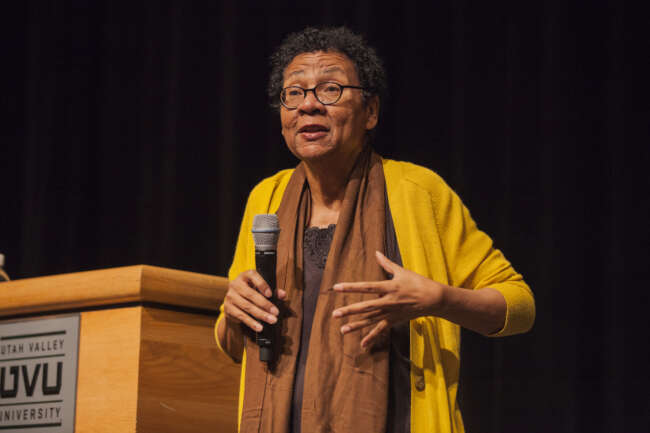An open dialogue with bell hooks
Photo by Kimberly Bojorquez
“Everybody in this room works differently, loves differently, has sex or no sex differently because of feminism said bell hooks Sept. 20 in the Ragan Theater. The auditorium filled past its 400-person capacity with overflow into room 213b.
hooks, who lowercases her name, dedicated the time to author Terry Tempest Williams. She said that Williams is an advocate for environmental concerns and that women who are engaged in this struggle are often ignored in comparison to the attention given to men.
hooks started by reading different passages, speaking about the social issues of overconsumption by the rich and the critical connection between the degradation of the environment and war, which allows global violence against women and children.
In relation to universities’ efforts towards diversity, hooks read from Winslow Myer’s book Living Beyond War. “Pluralism is not diversity alone but the energetic engagement with diversity,” hooks said.
She discussed violence and how part of the important work of ending sexism involves opposing war. “There is no one who can tell me that they’re pro-women and for women’s freedom and be pro-war. Because war is infinitely tied to the destruction of women’s lives,” hooks said.
In order to challenge the patriarchy, we should care about not just individual African American men who are victims of police brutality, but we should also care about what’s happening to children, according to hooks.
Nathan Roundy, a political science major who is enrolled in the class that hooks visited, asked about intersectionality and how we can talk about race and sexism without invalidating either of the two. hooks said that conversations are often circumstantial but that in order to critically discuss these topics, we should examine imperialist, white supremacist, capitalist patriarchy.
“For me, if we’re going to do intersectionality, we have to acknowledge how all of those systems of domination are linked,” hooks said.
Tiffanie Perotti, a philosophy major, said she thinks hooks’ work can be difficult for some students, but that they are also open to her ideas. “hooks’ writing focuses on the intersections of race, class and gender and how the dynamics of each of these contribute to, and even create, varying systems of oppression. While this is an intricately complex convergence, hooks manages to express the complexity in a remarkably accessible way,” she said.
Darah Snow, Director of UVU’s Multicultural Student Services, said that hooks reiterated some of points from her book Teaching to Transgress, explaining that feminism isn’t about taking on an identity, rather it’s a political practice to counter and end racist and sexist oppression.
hooks also analyses and challenges films. For example, in The Big Sick, the Muslim mother is portrayed as an unlikable tyrant while the white mother is more of a saint according to hooks.
Chase Hobson, an integrated studies major who is part of UVU’s Native American Initiative, said that he didn’t notice the mother’s roles as a stereotype until hooks pointed it out. Hobson said that he can see how hooks is asking people to reframe their mindsets.









Bell Hooks is my heroine!